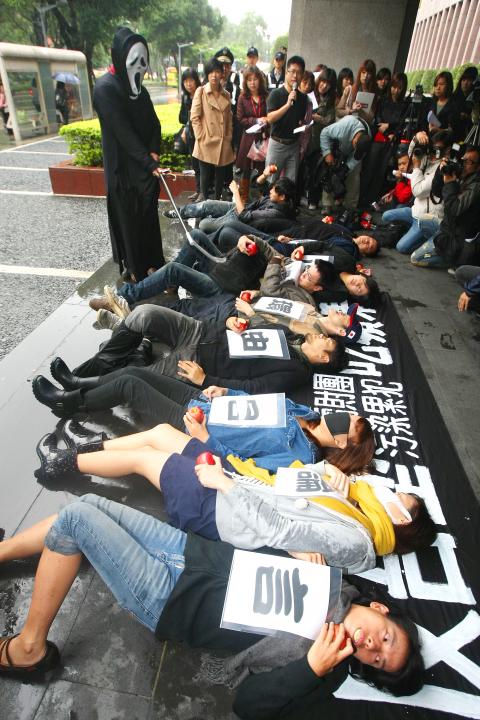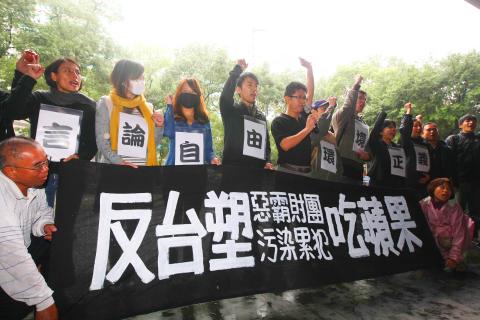With Formosa Plastics Group (FPG) one of the three groups seeking to buy Hong Kong-based Next Media Group’s four Taiwanese media outlets, several environmentalists groups yesterday held a protest against the buyout plan in front of the FPG’s headquarters in Taipei, saying the buyout was likely to kill freedom of speech in the media.
The NT$17.5 billion (US$601.2 million) buyout plan of the four outlets — the Apple Daily, the Sharp Daily, Next Magazine and Next TV — could be sold to a consortium comprised of Want Want China Times Group chairman Tsai Eng-meng (蔡衍明), Chinatrust Charity Foundation chairman Jeffery Koo Jr (辜仲諒) and Formosa Plastics Group chairman William Wong (王文淵).
“No to FPG eating the Apple,” “against the habitual offender of the environment,” “freedom of speech,” “environmental justice,” the groups repeatedly shouted out in front of FPG’s headquarters.

Photo: CNA
Several representatives of the groups lay on the ground, pretending to be poisoned, after eating a red apple given to them by an activist dressed as the Grim Reaper.
They said the play symbolized how dissenting opinions against the FPG may be silenced if it becomes an investor in the media outlets.
“For the media to turn from a public tool that speaks for the people to a tool that serves tyrannical corporations is something that the people cannot tolerate,” Citizen of the Earth Taiwan chairperson Lee Ken-cheng (李根政) said.

Photo: CNA
The FPG’s plants contribute to a large proportion of the carbon emissions in Taiwan, Lee said, adding that if it buys the media outlets, it would become impossible for the media to truthfully report any industrial accidents that may occur again at FPG’s petrochemical plants or the latest progress of its development projects at the environmental impact assessment meetings.
The groups said the FPG has already shown its repressive attitude toward opposing voices, pointing to a lawsuit FPG filed earlier this year after an academic research project showed the possible relationship between cancer and gases emitted from the company’s sixth naphtha cracker in Yunlin County’s Mailiao Township (麥寮).
The activists also mentioned a resident in Yunlin County, who received a legal letter from the company after he expressed suspicions that the naphtha cracker might be damaging his health.
“The government should review such an important media acquisition case carefully, from the perspective of the public interest and social safety” Campaign for Media Reform convener Lin Li-yun (林麗雲) said.
Citing an example of the Guardian Media Group in the UK, Wild at Heart Legal Defense Foundation attorney Tsai Ya-ying (蔡雅瀅) said that if FPG insists on investing in the Next Media Group, it should hand over its media operations to a trust foundation, so that investors could not directly interfere with editorial independence.
FPG vice president Lin Sang-chi (林善志) said because the buyout plan is not settled, the company would not make any comment at this point.
In response to questions on how the company views alleged health damage to residents in Yunlin and Changhua, Lin said the correlation still needs to be proven by long-term investigations.

Taiwan is stepping up plans to create self-sufficient supply chains for combat drones and increase foreign orders from the US to counter China’s numerical superiority, a defense official said on Saturday. Commenting on condition of anonymity, the official said the nation’s armed forces are in agreement with US Admiral Samuel Paparo’s assessment that Taiwan’s military must be prepared to turn the nation’s waters into a “hellscape” for the Chinese People’s Liberation Army (PLA). Paparo, the commander of the US Indo-Pacific Command, reiterated the concept during a Congressional hearing in Washington on Wednesday. He first coined the term in a security conference last

Prosecutors today declined to say who was questioned regarding alleged forgery on petitions to recall Democratic Progressive Party (DPP) legislators, after Chinese-language media earlier reported that members of the Chinese Nationalist Party (KMT) Youth League were brought in for questioning. The Ministry of Justice Investigation Bureau confirmed that two people had been questioned, but did not disclose any further information about the ongoing investigation. KMT Youth League members Lee Hsiao-liang (李孝亮) and Liu Szu-yin (劉思吟) — who are leading the effort to recall DPP caucus chief executive Rosalia Wu (吳思瑤) and Legislator Wu Pei-yi (吳沛憶) — both posted on Facebook saying: “I

The Ministry of Economic Affairs has fined Taobao NT$1.2 million (US$36,912) for advertisements that exceed its approved business scope, requiring the Chinese e-commerce platform to make corrections in the first half of this year or its license may be revoked. Lawmakers have called for stricter enforcement of Chinese e-commerce platforms and measures to prevent China from laundering its goods through Taiwan in response to US President Donald Trump’s heavy tariffs on China. The Legislative Yuan’s Finance Committee met today to discuss policies to prevent China from dumping goods in Taiwan, inviting government agencies to report. Democratic Progressive Party Legislator Kuo Kuo-wen (郭國文) said

The Ministry of Economic Affairs has fined Taobao NT$1.2 million (US$36,900) for advertisements that exceeded its approved business scope and ordered the Chinese e-commerce platform to make corrections in the first half of this year or its license would be revoked. Lawmakers have called for stricter supervision of Chinese e-commerce platforms and more stringent measures to prevent China from laundering its goods through Taiwan as US President Donald Trump’s administration cracks down on origin laundering. The legislature’s Finance Committee yesterday met to discuss policies to prevent China from dumping goods in Taiwan, inviting government agencies to report on the matter. Democratic Progressive Party